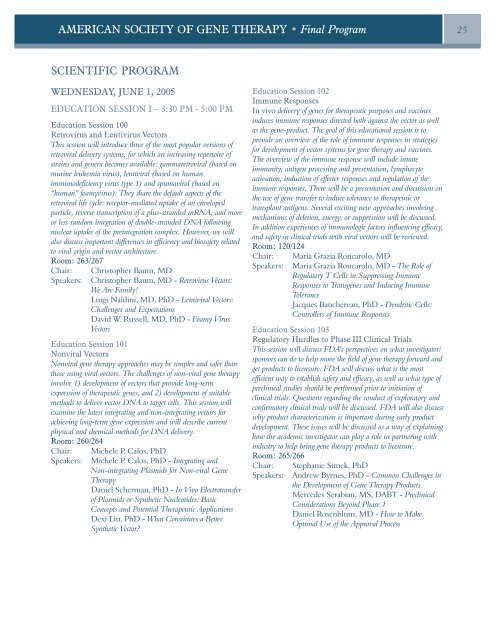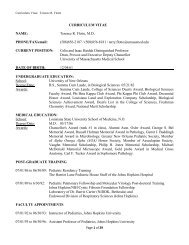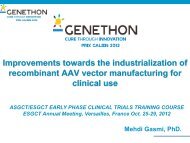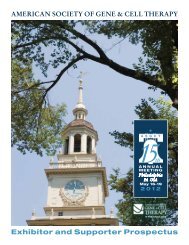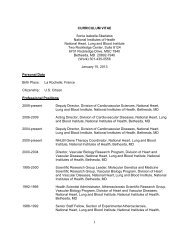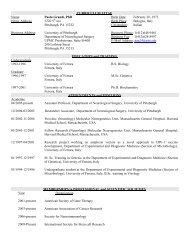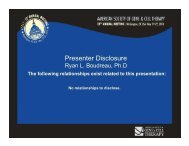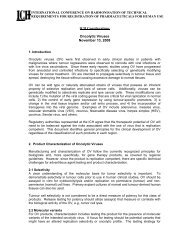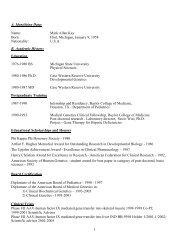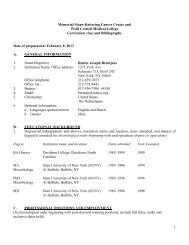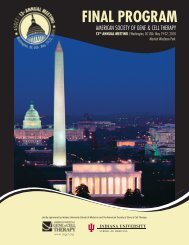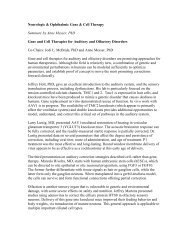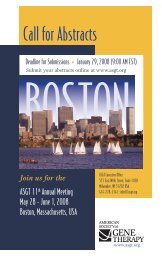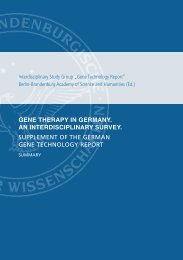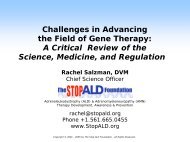FINAL PROGR AM - American Society of Gene & Cell Therapy
FINAL PROGR AM - American Society of Gene & Cell Therapy
FINAL PROGR AM - American Society of Gene & Cell Therapy
Create successful ePaper yourself
Turn your PDF publications into a flip-book with our unique Google optimized e-Paper software.
<strong>AM</strong>ERICAN SOCIETY OF GENE THERAPY • Final Program 25<br />
SCIENTIFIC <strong>PROGR</strong><strong>AM</strong><br />
WEDNESDAY, JUNE 1, 2005<br />
EDUCATION SESSION I – 3:30 PM - 5:00 PM<br />
Education Session 100<br />
Retrovirus and Lentivirus Vectors<br />
This session will introduce three <strong>of</strong> the most popular versions <strong>of</strong><br />
retroviral delivery systems, for which an increasing repertoire <strong>of</strong><br />
strains and genera becomes available: gammaretroviral (based on<br />
murine leukemia virus), lentiviral (based on human<br />
immunodeficiency virus type 1) and spumaviral (based on<br />
“human” foamyvirus). They share the default aspects <strong>of</strong> the<br />
retroviral life cycle: receptor-mediated uptake <strong>of</strong> an enveloped<br />
particle, reverse transcription <strong>of</strong> a plus-stranded mRNA, and more<br />
or less random integration <strong>of</strong> double-stranded DNA following<br />
nuclear uptake <strong>of</strong> the preintegration complex. However, we will<br />
also discuss important differences in efficiency and biosafety related<br />
to viral origin and vector architecture.<br />
Room: 263/267<br />
Chair: Christopher Baum, MD<br />
Speakers: Christopher Baum, MD - Retrovirus Vectors:<br />
We Are Family!<br />
Luigi Naldini, MD, PhD - Lentiviral Vectors:<br />
Challenges and Expectations<br />
David W. Russell, MD, PhD - Foamy Virus<br />
Vectors<br />
Education Session 101<br />
Nonviral Vectors<br />
Nonviral gene therapy approaches may be simpler and safer than<br />
those using viral vectors. The challenges <strong>of</strong> non-viral gene therapy<br />
involve 1) development <strong>of</strong> vectors that provide long-term<br />
expression <strong>of</strong> therapeutic genes, and 2) development <strong>of</strong> suitable<br />
methods to deliver vector DNA to target cells. This session will<br />
examine the latest integrating and non-integrating vectors for<br />
achieving long-term gene expression and will describe current<br />
physical and chemical methods for DNA delivery.<br />
Room: 260/264<br />
Chair: Michele P. Calos, PhD<br />
Speakers: Michele P. Calos, PhD - Integrating and<br />
Non-integrating Plasmids for Non-viral <strong>Gene</strong><br />
<strong>Therapy</strong><br />
Daniel Scherman, PhD - In Vivo Electrotransfer<br />
<strong>of</strong> Plasmids or Synthetic Nucleotides: Basic<br />
Concepts and Potential Therapeutic Applications<br />
Dexi Liu, PhD - What Constitutes a Better<br />
Synthetic Vector?<br />
Education Session 102<br />
Immune Responses<br />
In vivo delivery <strong>of</strong> genes for therapeutic purposes and vaccines<br />
induces immune responses directed both against the vector as well<br />
as the gene-product. The goal <strong>of</strong> this educational session is to<br />
provide an overview <strong>of</strong> the role <strong>of</strong> immune responses in strategies<br />
for development <strong>of</strong> vector systems for gene therapy and vaccines.<br />
The overview <strong>of</strong> the immune response will include innate<br />
immunity, antigen processing and presentation, lymphocyte<br />
activation, induction <strong>of</strong> effecter responses and regulation <strong>of</strong> the<br />
immune responses. There will be a presentation and discussion on<br />
the use <strong>of</strong> gene transfer to induce tolerance to therapeutic or<br />
transplant antigens. Several exciting new approaches involving<br />
mechanisms <strong>of</strong> deletion, energy, or suppression will be discussed.<br />
In addition experiences <strong>of</strong> immunologic factors influencing efficacy,<br />
and safety in clinical trials with viral vectors will be reviewed.<br />
Room: 120/124<br />
Chair: Maria Grazia Roncarolo, MD<br />
Speakers: Maria Grazia Roncarolo, MD - The Role <strong>of</strong><br />
Regulatory T <strong>Cell</strong>s in Suppressing Immune<br />
Responses to Transgenes and Inducing Immune<br />
Tolerance<br />
Jacques Banchereau, PhD - Dendritic <strong>Cell</strong>s:<br />
Controllers <strong>of</strong> Immune Responses<br />
Education Session 103<br />
Regulatory Hurdles to Phase III Clinical Trials<br />
This session will discuss FDA’s perspectives on what investigator/<br />
sponsors can do to help move the field <strong>of</strong> gene therapy forward and<br />
get products to licensure. FDA will discuss what is the most<br />
efficient way to establish safety and efficacy, as well as what type <strong>of</strong><br />
preclinical studies should be performed prior to initiation <strong>of</strong><br />
clinical trials. Questions regarding the conduct <strong>of</strong> exploratory and<br />
confirmatory clinical trials will be discussed. FDA will also discuss<br />
why product characterization is important during early product<br />
development. These issues will be discussed as a way <strong>of</strong> explaining<br />
how the academic investigator can play a role in partnering with<br />
industry to help bring gene therapy products to licensure.<br />
Room: 265/266<br />
Chair: Stephanie Simek, PhD<br />
Speakers: Andrew Byrnes, PhD - Common Challenges in<br />
the Development <strong>of</strong> <strong>Gene</strong> <strong>Therapy</strong> Products<br />
Mercedes Serabian, MS, DABT - Preclinical<br />
Considerations Beyond Phase 1<br />
Daniel Rosenblum, MD - How to Make<br />
Optimal Use <strong>of</strong> the Approval Process


